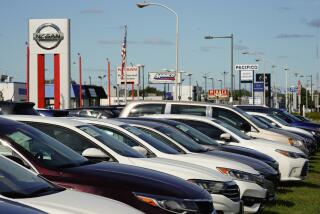Industry Says Home Costs to Rise Unless Congress Acts
WASHINGTON â The cost of a typical $75,000 home loan may rise by $750 for thousands of home buyers who use Federal Housing Administration and Veterans Administration mortgages unless Congress votes to lift restrictions on government credit activities, housing industry officials said Monday.
And new FHA loans may not be available at all next month, when the agency will reach its lending limit of $57.4 billion, if Congress fails to expand the agencyâs lending authority, according to the Mortgage Bankers Assn. and the National Assn. of Home Builders.
A wave of refinancing by homeowners rushing to get new mortgages with lower rates âhas run smack up against federal regulations,â said Warren Lasko, executive vice president of the Mortgage Bankers Assn., the trade group for lenders who make FHA and VA loans.
Such loans are grouped together as securities and sold to investors with the Government National Mortgage Assn. (Ginnie Mae) providing guarantees for payment of the securities. But Ginnie Mae has reached its legal limit of $65.3 billion and cannot offer backing for any new securities.
Without the guarantees, investors will demand higher interest rates, ranging from 0.375 to 0.5 percentage point higher, before they accept VA and FHA mortgages, Lasko told a news conference. This means that the people who use FHA and VA loans to buy homes will have to pay higher rates.
The higher interest rates, added to expected higher fees for arranging mortgages, will translate into one point, an amount equal to 1% of the loan, paid when the final signing of the FHA or VA loan takes place. For example, one point of a $75,000 loan would be $750.
Conventional loans provided by banks or savings and loan associations without FHA or VA guarantees could become more costly, too, because the general credit market will tighten, Lasko said. But he offered no estimates on the potential increase in conventional rates.
FHA and VA loans account for about 20% of the mortgage market. Frequently, FHA buyers are people who may have trouble getting regular financing because of ârace or income or because they want to buy a house in an older neighborhood,â Lasko said. Many first-time buyers with annual incomes between $15,000 and $20,000 use FHA loans, said Kent Colton, executive vice president of the National Assn. of Home Builders.
VA loans require virtually no down payment, and FHA loans call for a down payment of 5% of the price, Colton said. Conventional loans, by contrast, require a down payment of at least 10% of the price.
Less Restrictive
In addition, the FHA and VA, which guarantee payment to the lender if the homeowner defaults on the mortgage, are less restrictive for buyers. Because the government guarantees the loans, the lender will allow an FHA or VA borrower to spend comparatively more of his monthly income on mortgage payments than a borrower with a conventional loan.
The pending market squeeze has resulted because âweâre rewinding the clock, turning back timeâ to a period of low interest rates not seen since before 1978, Lasko said.
âThe good news is that there are eight yearsâ worth of mortgages to be refinanced,â he said.
There are 1.9 million FHA and VA loans carrying an interest rate of 12% or more, compared to a current VA ceiling of 9.5%.
The FHA has a limit of $90,000 for a home purchased with one of its loans, and the VA limits its loans to a maximum of $135,000.
About half of Ginnie Mae activity relates to mortgage refinancing, and the rush of applicants drove Ginnie Mae to its ceiling of $65.3 billion last week. Lasko said the limit should be increased to $125 billion.
However, the Reagan Administration has not yet decided on the size of the requested Ginnie Mae ceiling increase, Office of Management and Budget spokesman Ed Dale said Monday.
The Administration also wants to change lending policies, limit FHA loans to families with incomes below $40,000 a year and restrict them to purchases of primary residences, not homes bought for vacations or investment.
Would Hamper Construction
These changes are strongly opposed by the housing industry, which wants Congress to act quickly to expand Ginnie Maeâs authority without altering its policies.
A shutdown of Ginnie Mae and the impending halt to FHA loans would hamper housing construction, Colton said.
The housing industry had expected to build 1.3 million single-family homes this year, but the number could shrink by 250,000 unless Congress expands the financial resources of Ginnie Mae and the FHA, he said.
More to Read
Inside the business of entertainment
The Wide Shot brings you news, analysis and insights on everything from streaming wars to production â and what it all means for the future.
You may occasionally receive promotional content from the Los Angeles Times.










